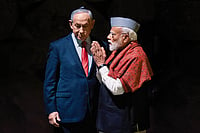Across the world, as citizens challenge the established order, protest movements take shape. Some change history. Others are crushed. But there are a few rare ones that capture the world’s imagination. The desperate self-immolation of a young man in Tunisia in December 2010 did just that, as hope for change swept across the Arab world.
Black Lives Matter (BLM) is another iconic movement of our times—a fight for justice in the US that reverberated among young immigrants in Europe, who saw in it a reflection of their own plight. While BLM has brought out latent divisions in American society and politics, Joe Biden’s election victory can also be attributed to BLM’s mobilisation of black voters and their determination to oust Donald Trump from the White House.
Arab Spring: Tunisia It was a bright, cold December day in 2010, in the small rural township of Sidi Bouzid in central Tunisia. That morning, street vendor Mohammed Bouazizi loaded his cart and was ready for business. Bouazizi was the sole provider of his family of six siblings and an aging uncle. His father had died when he was just three. They lived with an uncle, who could barely make ends meet from working on a small patch of land he had inherited. Bouazizi had to find spare work since he was just 10 years old.
At 26, life was difficult for the young man. He had borrowed US $200 from a friend to buy supplies he sold in his cart. But on that fateful day, the police, always on the lookout for a quick buck, accosted him, demanded to see a license for his cart, then proceeded to insult him, beat him up and destroyed the vegetables and supplies on it.
It wasn’t the first time he was harassed by police. But that morning, something snapped inside him. He could not take life’s blows anymore, and set himself ablaze. As news of his self-immolation spread, suddenly, the whole country was out on the streets. It was as if his desperate act had hit a raw nerve, opening floodgates of anger against the regime. Angry citizens took to the streets to denounce police brutality and the corruption encouraged by the rulers. Tunisia was on boil. President Zine al-Abidine Ben Ali was forced to step down on January 14 and flee the country.
ALSO READ: 'Hum Dekhenge': Times When India Protested

Rock the qasbah Protesters step on a Mubarak poster at Tahrir Square in 2011 (left), supporters of al-Sisi gather at Tahrir Square in 2014
Across the Arab world, people hit the streets hoping to replicate Tunisia. Suddenly, the silent masses had hope they could take on their oppressors. Arab Spring had taken off. For a while, it seemed poised to change contours of the Arab world, as nervous rulers took note of the rumblings in the qasbahs and bazaars. Soon, Cairo’s Tahrir Square became the focal point of Arab protests, as Egypt’s long-suffering people rose up against Hosni Mubarak, who had ruled with an iron fist for 30 long years. Social media played a major part in organising the Tahrir Square protests. Wael Ghonim, a computer engineer working in Dubai with Google, had begun a Facebook page in June 2010 “We are all Khaled Said” to highlight police beating an Egyptian man to death. The page was welcomed by Egyptians, who discussed cases of police brutality and stayed in touch all through the Tunisian protests. When protests began in Egypt, Ghonim’s Facebook page helped get people together.
When Hosni Mubarak stepped down in February 2011, it seemed Arab Spring had achieved the unthinkable. Similar protests took off in Yemen, Libya, Syria and Bahrain. Ten years have passed. Things are back to square one. General Abdel Fattah al-Sisi led a coup and has been ruling Egypt as President since 2014. Egypt is back to where it was, with jails full of political prisoners.
Black Lives Matter: USA In 2013, three feisty Black women—Alicia Garza, Patrisee Cullors and Opal Tometi—started a movement centred on justice for African-Americans, called Black Lives Matter (BLM), in response to the acquittal of George Zimmerman in the shooting to death of Trayvon Martin, a 17-year-old African-American in 2012.
BLM hit the international headlines after George Floyd died in the hands of Minneapolis cops, whose inhuman behaviour led to worldwide protests against police brutality and systematic racism that affects blacks.

Protest against the ‘Covid pass’ in Brussels
But change is slow. There is greater awareness of problems faced by African-Americans, yet the position of the US conservative right has also hardened. This week, 17-year-old White teen Kyle Rittenhouse was acquitted of all charges of shooting to death two men and injuring a third during the 2020 protests at Kenosha, Wisconsin. They were not black but supporters of BLM.
Did the protests have any lasting impact on US politics or society? Yes, says Archana Pandey of the Washington-based Hudson Institute. “First, the emergence and strengthening of the progressive wing of the Democratic Party, which got minorities out to vote and help Biden win, and since then, has been pushing through crucial bills in the US Congress. Second, the unfortunate but expected pushback from rightwing ideologues and politicians, ensuring that GoP continues with its Trumpian policies and views, led to defeats in gubernatorial and assembly elections in Virginia for the Democrats. Third, there is deeper polarisation on issues like race, gender, gun rights, immigration and foreign policy.”
She adds, “Fourth, issues of democracy, human rights and women’s rights are more important to progressive Democrats. Hence, the US decision to boycott China. Fifth, corporates and large organisations are more likely to take action against staff identified as racist, sexist or anti-democracy. Corporates are standing up for BLM, rights of women and LGBTQ, and against voter suppression.”
Covid-19 protests: Pan-Europe In the wake of the Covid pandemic, anti-vaccine and anti-restriction protesters across Europe are saying their fundamental rights are at stake. At the moment, Europe is again the epicentre of the pandemic, with authorities struggling to stop the spread. It is a bizarre situation where angry people are questioning governments grappling with Covid-19, imposing lockdowns to stop the virus from spreading and triggering another emergency. Lockdowns were the most effective means of containing the virus before vaccines arrived. Incidentally, most protesters are also anti-vaxxers, saying authorities cannot take decisions that go against their right to decide whether they want anti-bodies injected into their system. Far-right parties in Europe are supporting the protesters as they are on the same page on both lockdown restrictions and vaccine hesitancy.
(This appeared in the print edition as "Streets on Fire")
ALSO READ























